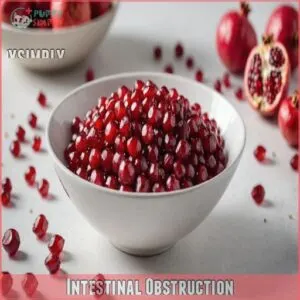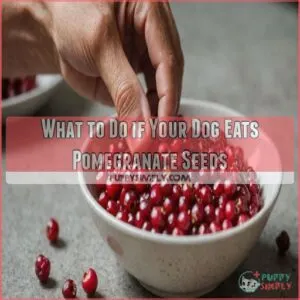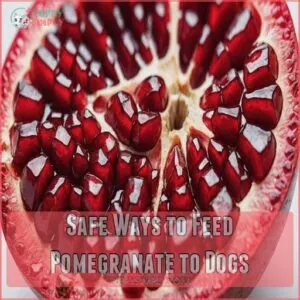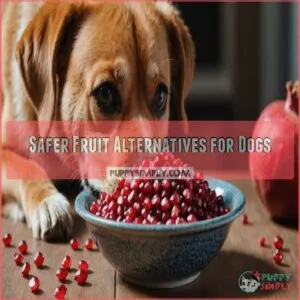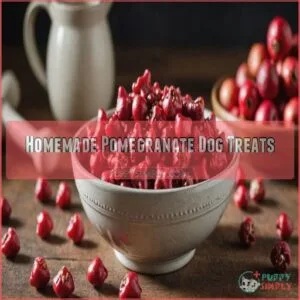This site is supported by our readers. We may earn a commission, at no cost to you, if you purchase through links.
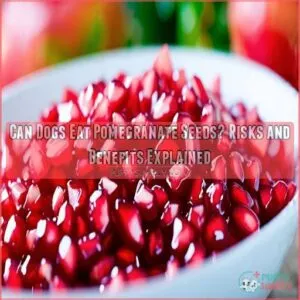
While pomegranates are packed with antioxidants, the seeds themselves can be tricky.
They might cause digestive upset or, in worst cases, an intestinal blockage.
Picture your dog as a living vacuum cleaner—those tiny pomegranate seeds could clog the works!
If your dog accidentally gobbles a couple, it’s likely okay, especially for a healthy adult dog.
But why risk it?
Offering safer fruit alternatives keeps tails wagging without a hitch.
Curious about how pomegranates can be part of your dog’s diet?
Let’s unravel the mystery!
Table Of Contents
- Key Takeaways
- Health Benefits of Pomegranates for Dogs
- Potential Risks of Pomegranate Seeds for Dogs
- Can Dogs Eat Pomegranate Seeds?
- Signs of Pomegranate Poisoning in Dogs
- What to Do if Your Dog Eats Pomegranate Seeds
- Safe Ways to Feed Pomegranate to Dogs
- Safer Fruit Alternatives for Dogs
- Homemade Pomegranate Dog Treats
- Frequently Asked Questions (FAQs)
- Can dogs eat raw pomegranate seeds?
- Is it safe to eat the whole pomegranate seed?
- Are Pomegranates Bad for dogs?
- Can dogs eat pomegranate arils?
- What happens if a dog eats pomegranate seeds on an empty stomach?
- Can pomegranate extract be used in dog food?
- Is pomegranate dog friendly?
- What does pomegranate do for dogs?
- Are pomegranate trees toxic to dogs?
- Are pomegranate seeds safe to eat?
- How should you introduce new fruits to dogs?
- Are pomegranate-flavored dog treats safe?
- Can dogs overdose on pomegranate vitamins?
- Is pomegranate juice okay for dogs?
- Are there dog breeds more sensitive to pomegranate?
- Conclusion
Key Takeaways
- Pomegranate seeds aren’t toxic, but they’re difficult for dogs to digest and can cause upset stomachs or intestinal blockages.
- Small amounts might be okay for a healthy adult dog, but it’s best to avoid them altogether.
- If your dog eats pomegranate seeds, watch for vomiting, diarrhea, lethargy, or abdominal pain. Contact your vet if you see these symptoms.
- Safer alternatives include berries, apples, and watermelon – always offer fruits in moderation and consult your vet if unsure.
Health Benefits of Pomegranates for Dogs
You’re probably curious if dogs can benefit from pomegranates, and the answer is yes—with caution.
Packed with antioxidants and nutrients, pomegranate extracts may support your dog’s gut health and even provide anti-inflammatory perks, but always consult your vet before adding it to their diet.
Antioxidants and Nutrients
Imagine your furry friend enjoying the pomegranate’s antioxidant power!
These seeds pack a punch for dog health.
Here’s why:
- Nutrient profile: Loaded with vitamins C and K.
- Immune support: Helps fight pesky colds.
- Healthy aging: Keeps those tails wagging longer.
But remember, moderation is key.
Too much might cause tummy trouble, so sprinkle wisely!
Gut Health
While the antioxidants in pomegranate seeds are a win for your dog’s health, don’t forget their gut needs love too.
Probiotics, prebiotics, and fiber work wonders on the gut microbiome, promoting digestive health, which can be supported by dog digestive supplements.
Hindgut fermentation supported by these nutrients aids the dog digestive system.
Beware, though, because tannins in raw seeds might upset stomachs, so moderation is key.
Anti-inflammatory Properties
Just like gut health, pomegranate’s anti-inflammatory properties can benefit Rover, too.
Pomegranate can ease canine inflammation, potentially improving joint health and reducing arthritis pain.
Consider these benefits:
- Joint Relief: May ease arthritis discomfort in dogs.
- Inflammation Reduction: Supports overall health by curbing inflammation.
- Pomegranate Benefits: Harnesses tannins in moderation to protect dog health.
So, keep an eye on Rover’s diet!
Potential Risks of Pomegranate Seeds for Dogs
While pomegranates offer some potential health benefits, those hard seeds pose a few risks for your canine companion.
They’re tough to digest and could cause upset stomachs, or even worse, an intestinal blockage, so it’s best to keep them away from your furry friend.
Digestive Issues
Too many pomegranate seeds can give your dog’s stomach a real workout.
Thanks to their high tannin levels and fiber content, these seeds might cause gastrointestinal upset, leading to stomach issues.
It’s like giving your dog a spicy taco—probably not the best idea!
For safer treats, stick to dog food with controlled ingredients to avoid digestive issues.
Intestinal Obstruction
Intestinal obstruction is no joke for your dog.
Those tiny pomegranate seeds can cause a gastrointestinal obstruction, leading to symptoms like vomiting and loss of appetite.
Prevention is key—keep these seeds out of their dog food.
If your furry pal sneaks some, watch for symptoms and seek treatment to guarantee a smooth recovery.
Remember, their safety’s in your hands!
Choking Hazard
While sharing pomegranate seeds with your furry friend might seem harmless, they pose a significant dog choking risk, especially for small breeds.
These tiny seeds can easily become choking hazards or get stuck, leading to gastrointestinal obstruction.
Stick to safe treats like chew toys, crafted to prevent choking, ensuring your pooch’s snack time stays free of surprises and stress.
Can Dogs Eat Pomegranate Seeds?
You’ve probably wondered, "Can dogs eat pomegranate seeds?" Well, let’s tackle this head-on. Although pomegranate seeds aren’t poisonous to dogs, they come with a handful of concerns. For one, their high tannin content can upset a dog’s tummy, leading to an unfavorable reaction. Additionally, the seeds are tough to digest and may cause your dog to throw up. The seeds also contain compounds that can lead to intestinal blockage, especially for small dogs, as explained in pomegranate seeds risks.
Here are some things to keep in mind:
- Pomegranate Seed Toxicity: Raw seeds can lead to digestive distress.
- Dog-Safe Fruit Choices: Incorporate apples or berries instead.
- Pomegranate Juice Safety: In moderation, it’s generally okay.
- Homemade Dog Treat Recipes: Incorporate pomegranate safely with recipes.
Keep your furry companion’s health in check, and when in doubt, discuss options with your vet.
Signs of Pomegranate Poisoning in Dogs
If your dog munches on pomegranate seeds, you might notice them exhibiting signs of discomfort like vomiting or diarrhea.
Keep an eye out for symptoms like lethargy and abdominal pain, and reach out to your vet if these occur—dogs don’t have the strongest poker faces when they’re unwell!
Vomiting and Diarrhea
Pomegranate seeds might seem harmless, yet they can be sneaky troublemakers for dogs.
If your furry friend indulges, you might notice vomiting or diarrhea.
These symptoms point to pomegranate toxicity and can cause discomfort.
Keep a watchful eye and offer remedies like extra hydration.
When to worry? If symptoms persist, it’s wise to consult your vet for guidance.
Lethargy
That sleepy pup? Lethargy‘s a serious sign of potential pomegranate poisoning.
Your dog’s unusual tiredness might also be a sign of a more severe underlying issue, such as heatstroke or vestibular disease, which can cause drunken behavior in dogs.
Here’s what to watch for:
- Unusual tiredness.
- Reduced activity levels.
- A noticeable drop in your dog’s usual energy.
- Appearing less playful than normal.
If you notice these symptoms after your dog’s had pomegranate, don’t delay; early action is key!
Abdominal Pain
If your dog seems lethargic and then starts showing signs of stomach upset or abdominal pain, those pesky pomegranate seeds might be the culprits.
They’re packed with tannins that can irritate your pup’s tummy.
If you suspect pomegranate poisoning, consider safe products like pomegranate seeds dogs.
Keeping an eye on them and offering home remedies like a bland diet can help.
If the discomfort persists, a vet visit is wise to prevent dog poisoning.
What to Do if Your Dog Eats Pomegranate Seeds
If your curious pup snacks on pomegranate seeds, don’t panic; instead, keep a close eye on them for any signs of digestive upset.
Remember, it’s always a good idea to contact your vet if they start acting like they just ate a sofa instead of a fruit.
Monitor for Symptoms
After your furry friend nibbles on those tricky pomegranate seeds, keep an eagle eye on them for symptoms like vomiting, diarrhea, or lethargy.
Stomach’s in knots or appetite dives? It’s your cue to spring into action.
Picture it this way: you’re both detectives.
Spotting those pomegranate poisoning symptoms, like abdominal pain, means acting fast to dodge a bigger canine conundrum.
Safety first, always!
When to Contact a Veterinarian
Noticing your dog ate a whole pomegranate, you’re likely worried.
Keep an eye out for severe vomiting, persistent diarrhea, or a loss of appetite.
Signs like lethargy and weakness are your signals to call a veterinarian right away.
Pomegranate toxicity in dogs can sneak up quickly, so better safe than sorry.
Remember, there’s no harm in seeking professional advice if symptoms appear.
Safe Ways to Feed Pomegranate to Dogs
You can safely share pomegranate with your dog by sticking to extracts or fresh-squeezed juice in moderation.
While the seeds themselves might lead to tummy troubles, these options let you provide the benefits without the risks—just remember, even dogs can’t handle too much of a good thing!
Moderation is Key
Why not think of pomegranates for your dog like a tasty treat, not a main course?
Use moderation to keep things safe:
- Small amounts: Only a few seeds.
- Mix with food: Balance with other dog-friendly meals.
- Juice over seeds: Safer choice.
- Occasional treat: Don’t overdo it.
- Watch for signs: Look out for digestive issues.
Pomegranate Extract
A few drops of high-quality pomegranate extract in your dog’s food offer potential pomegranate extract benefits, like improved digestion, which can be further aided by adequate fiber content, generally around 2.5% to 4.5% fiber in kibble, depending on the dog’s age.
Always check the extract safety information and the dog treat ingredients list before using it.
Start with a tiny amount to assess your dog’s reaction.
Remember, moderation is key; too much can upset their tummy.
Look for reputable extract brands.
While pomegranate seeds themselves pose a choking hazard, the extract bypasses that risk.
Always consult your vet before adding anything new to your furry friend’s diet.
Fresh-squeezed Juice
Think about fresh-squeezed juice as an intriguing way to let your dog enjoy pomegranate’s benefits without risking pomegranate seeds’ dog toxicity, just as you’d avoid giving them pistachios due to the potential for pistachio poisoning risks.
Make sure to dilute it and serve in small amounts.
Also, consider these perks:
- Boosts hydration: Keeps your dog refreshed.
- Low risk: Safer than raw seeds.
- Taste treat: Dogs love the flavor.
Safer Fruit Alternatives for Dogs
For treating your furry friend, consider safer fruit options like berries, apples, and watermelon that won’t upset their tummy.
These fruits are tasty and packed with nutrients, so you can feel good about sharing them—just remember, moderation is key!
Berries
Berries can be a safer snack for your dog than pomegranate seeds, which can cause digestive issues.
Blueberries, strawberries, and raspberries often steal the show during berry season.
They’re packed with antioxidants and are typically well-tolerated, though berry allergies aren’t unheard of.
Before you whip up a berry recipe for your pup, watch for any adverse reactions.
Apples
Got a pup with a penchant for fruit?
Apples are a great choice!
They provide vitamins and fiber, but not all parts are dog-friendly.
Stick with slices of different apple varieties, avoiding the core due to seeds.
Watch for apple allergies, and consider using apple cider vinegar in moderation as a treat.
Always go for safe, dog-aware options.
Watermelon
While apples are a delightful snack, you might think about watermelon as a juicy, safe summer treat for your dog.
Remember, though, to skip the seeds and rind to avoid digestive issues and potential dog allergies.
Offer small, seed-free cubes, and watch your furry friend enjoy the hydrating fun.
Keep safety first to make sure a wagging tail!
Homemade Pomegranate Dog Treats
Crafting homemade pomegranate dog treats can be a fun and rewarding way to spoil your furry friend, if done carefully.
Just remember to stick to safe ingredients and follow proper preparation techniques to avoid any tummy troubles.
Pomegranate Dog Treat Recipe
So, you’re ready to bake?
This simple recipe uses pomegranate juice, not seeds (remember, those are tricky!).
Mix in some oat flour, tapioca flour, eggs, coconut oil, and a touch of honey – you can also experiment with other dog treats recipe ideas from various resources online, such as various dog treats recipe.
Bake at 350°F for 12-15 minutes.
Let them cool completely before storing in an airtight container.
These homemade pomegranate dog treats are a healthy, tasty snack—a fun alternative to store-bought options!
Remember, moderation is key with any treat.
Safety Precautions
Baking homemade pomegranate dog treats can be fun, but don’t throw caution to the wind.
When selecting fruits for your pup, keep in mind that safe fruits for dogs should be prioritized to avoid any potential harm.
Remember these safety tips:
- Seed size matters: Chop them to prevent choking.
- Know your breed: Smaller dogs require extra care.
- Moderation is key: Don’t overindulge.
- Supervision is essential: Always watch your pup.
- Consult your vet: Get a professional thumbs-up.
These help make pomegranate seeds safe for dogs!
Frequently Asked Questions (FAQs)
Can dogs eat raw pomegranate seeds?
Imagine your dog as a tiny construction site where raw pomegranate seeds are like wrecking balls—they’re hard to digest and could cause tummy troubles.
It’s best to play it safe and avoid feeding them to your pooch.
Is it safe to eat the whole pomegranate seed?
Eating the whole pomegranate seed is generally safe for humans.
The crunchy seed inside adds fiber and nutrients, aiding digestion.
Chew well to ease digestion, but if seeds bother you, enjoy just the juicy arils instead.
Are Pomegranates Bad for dogs?
You might wonder if pomegranates are bad for your dog.
While not toxic, the seeds can cause digestive issues.
It’s wise to avoid the seeds and opt for dog treats with pomegranate extracts to guarantee safety.
Can dogs eat pomegranate arils?
While dogs can technically eat pomegranate arils, it’s best to avoid them.
Too many can upset their tummy.
A few might be okay, but moderation is key!
Always supervise your pup.
What happens if a dog eats pomegranate seeds on an empty stomach?
Imagine a dog’s curious nose, leading to trouble on an empty stomach.
Pomegranate seeds can cause tummy upset, vomiting, or diarrhea.
Offer water and watch for symptoms, reaching out to a vet if problems arise.
Can pomegranate extract be used in dog food?
Pomegranate extract in dog food provides health perks like aiding digestion and supporting heart health.
It’s safe in treats and meals, but remember, moderation is key to avoid tummy troubles and keep tails wagging happily.
Is pomegranate dog friendly?
Picture Fido wrestling with a sneaky pomegranate—funny but dicey.
Dogs can safely have pomegranate extracts, boosting health.
Yet, raw seeds?
Best to skip them to dodge tummy troubles.
Always monitor and consult your vet.
What does pomegranate do for dogs?
Pomegranates can boost your dog’s heart and digestive health with their vitamins and antioxidants.
However, skip raw seeds to avoid tummy troubles.
Opt for treats with pomegranate extracts that offer health benefits without digestive risks.
Are pomegranate trees toxic to dogs?
While pomegranate trees aren’t toxic to dogs, it’s best to keep Fido away.
Leaves and seeds can cause tummy trouble.
If your pup munches on them, monitor for vomiting or diarrhea and consult your vet if needed.
Are pomegranate seeds safe to eat?
Prickly pomegranate pits pose problems! They’re tough to digest, potentially causing tummy troubles. Moderation’s key; enjoy the juicy arils, but avoid swallowing seeds. Consult a doctor if issues arise.
How should you introduce new fruits to dogs?
Start with small amounts and introduce one new fruit at a time.
Watch for digestive issues or allergic reactions.
Consult your vet for specific advice.
Remember, not all fruits are safe, like grapes or cherries.
Are pomegranate-flavored dog treats safe?
Pomegranate-flavored dog treats are generally safe.
They often contain pomegranate extracts, offering health benefits without the digestive upset raw seeds can cause.
Always check ingredient lists and consult your vet if you’re uncertain about new treats.
Can dogs overdose on pomegranate vitamins?
Dogs can’t overdose on pomegranate vitamins specifically, but too much can cause digestive issues.
Watch for vomiting and diarrhea if you’re not careful.
Always introduce new foods slowly, and consult your vet for guidance.
Is pomegranate juice okay for dogs?
While pomegranate juice might sound appealing, it’s best to avoid giving it to your dog.
The juice’s sugar content can upset their stomachs, leading to digestive issues.
Stick to water for hydration and safety.
Are there dog breeds more sensitive to pomegranate?
Some dog breeds might be more sensitive to pomegranate, particularly smaller ones.
Their digestive systems can easily become upset.
Always monitor your pet after trying new foods and consult your vet if concerns arise.
Safety first!
Conclusion
Sharing pomegranate seeds with your dog can feel like walking a tightrope—balancing benefits and risks.
Pomegranates boast antioxidants, yet their seeds pose digestive dangers and choking threats.
It’s wise to err on the side of caution: skip the seeds and look for safer fruit picks like apples or berries.
If Fido sneaks a seed, keep a close eye for warning signs like vomiting.
Always remember, when deciding what your dog can eat, safety should wag its tail first.



